Assistant Professor Mike Ross’s love for botany, which is evident in the four walls of his classroom or during class-time walks around the Kapi’olani Community College campus, drives him to connect with all of his students on the pressing issues in the ecosystems. His sincerity relays the importance of a positive relationship with the environment. His captivating lectures quickly turn indifference into interest.
“Teaching has definitely helped maintain my passion,” he said. “As frustrating as it is to know that I can’t interest every student in the subject, it only causes me to teach that much more passionately.”
Ross’s introductory courses require a minimum of 20 hours of service learning, also described as a hands-on portion of the course that exhibits the importance of preserving the local habitat. Students choose from a list of local organizations like Friends of Diamond Head. Projects include planting helpful plant species, painting safety barriers, removing invasive plant species, cleaning up graffiti, and repairing necessary irrigation systems. Ross guarantees students that his classroom lectures will directly relate to the service-learning requirements, giving them tangible examples of what they’re studying.
A major change in our climate may seem like a problem of the future, but it could arrive sooner than expected, specifically on the Hawaiian Islands.
“The most frightening issue I’ve researched is happening right here in our state and it’s known as Rapid ‘Ohi’a Death,” Ross said of the fungal disease that continues to kill off the ‘Ohi’a Lehua plant, which happens to be found exclusively in Hawaiʻi, at an alarming rate. The disease has established itself on four of the Hawaiian islands, including Oʻahu. The plant is responsible for taking in substantial amounts of water from the underground aquifer, and without its presence, the vast quantity of unused water will find a new home above-ground.
“If ROD kills off the remainder of the ‘Ohi’a Lehua, not only will it be permanently extinct, we could see increased levels of flooding as well,” Ross said.
Born in Los Alamitos, Calif., his first encounter with the plant kingdom came as a teenager when he worked in the garden with his parents.
Ross enrolled at Orange Coast College, where he first realized he would prolong his newfound curiosity in plant science.
“The classroom is where I really started to enjoy the subject, that’s what convinced me that I wanted to make this a career,” he said. Rudimentary yet mind-blowing facts about plants, like the fact that they “eat light,” built a foundation of interest for Ross that continues growing today.
Upon moving to Hawai‘i 17 years ago, he subsequently earned his BS and Masters of Science in Botany. During his time as a graduate student, Ross took a position as a teacher’s assistant in hopes of covering the cost of his tuition.
“Deciding to attend graduate school meant that I had to find a way to make some money if I wanted to continue studying,” he said. “Taking a job as a teacher’s assistant, I was able to have my tuition waived. Working there in that atmosphere, It became pretty apparent to me that teaching was something I could see myself doing.”
Ross has not only embraced his educator position, he’s excelled at it. Last year, the University of Hawai‘i Board of Regents awarded him with the Regents’ Medal for Excellence in Teaching. According to the Board of Regents’ award summary, “He believes having students work directly with the ʻāina (earth) allows students to respect and sustain life.”
Although large corporations are responsible for the bulk of pollution that’s created, according to the 2017 Carbon Majors Report, Ross believes a reduction in human impact on the environment can be manifested on a smaller scale.
“One thing that we can do to reduce our harmful waste is to grow our own food,” he said. “It’s disturbing how much pollution is created in the importing process. By growing our own food, we can become more sustainable rather than totally relying on the current fossil-fuel driven methods.”
Ross doesn’t just offer consuming lectures on botany, he also lives the lifestyle accordingly.
“In my free time you can find me swimming or hiking in the mountains.” Ross said. The 37-year-old assistant professor also works with local environmental organizations to help preserve the crucial ecosystems that make up the island. Not only is Ross doing his part, he’s inspiring the people around him to contribute, too.

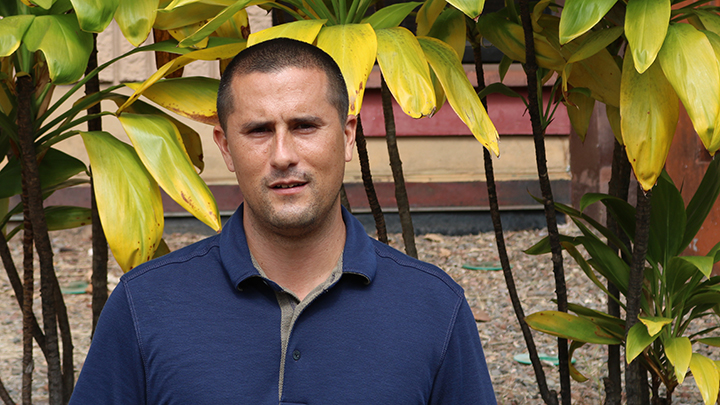
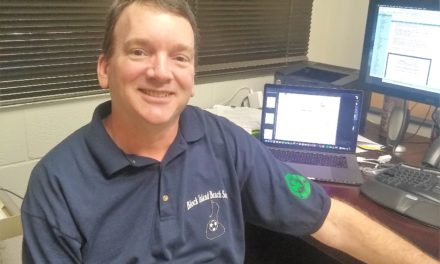
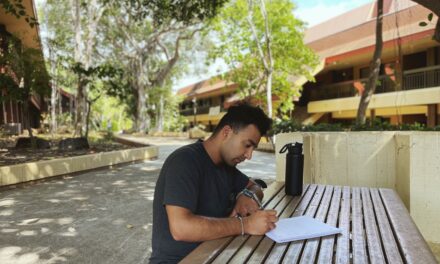
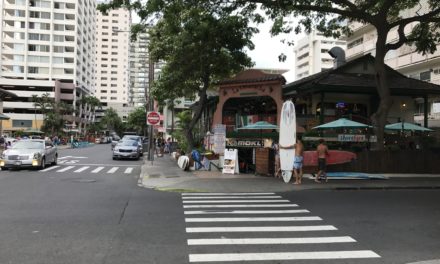
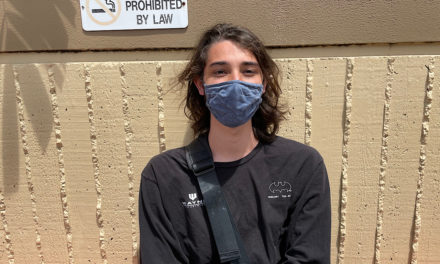
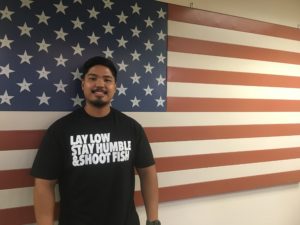
Professor Ross is one of the best instructors I had while going to KCC. If only the Culinary department were as interested in teaching everyone and treating everyone with respect.